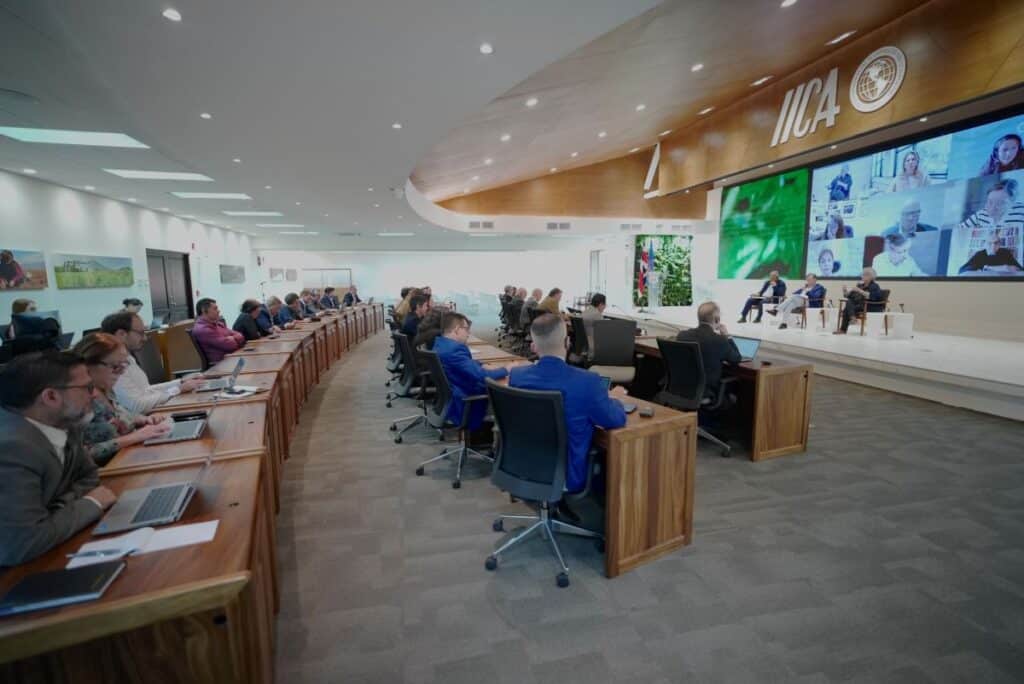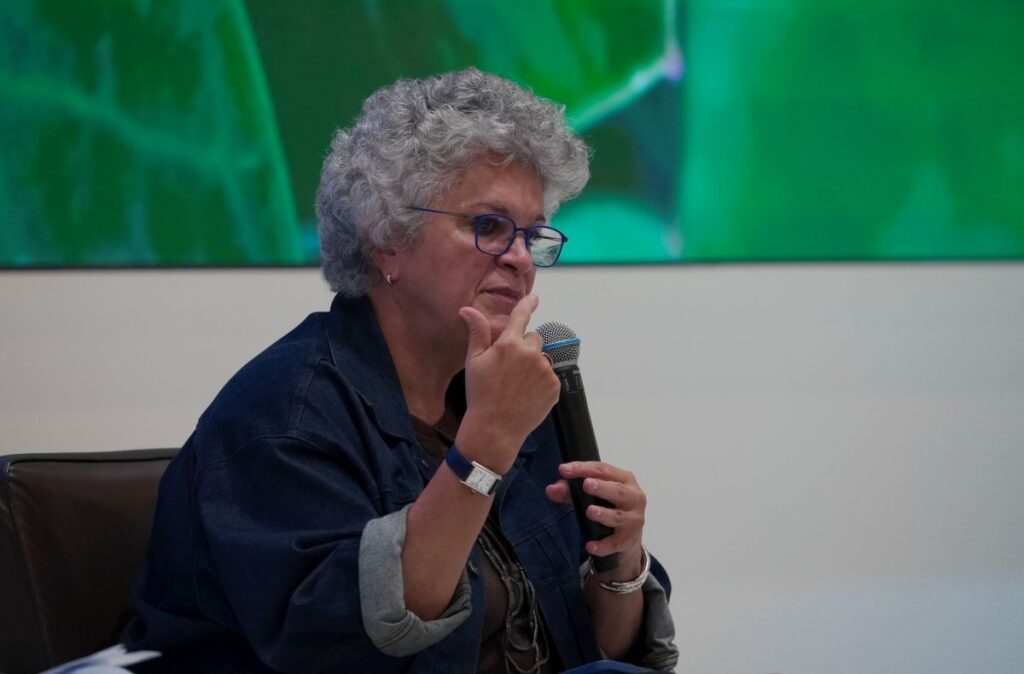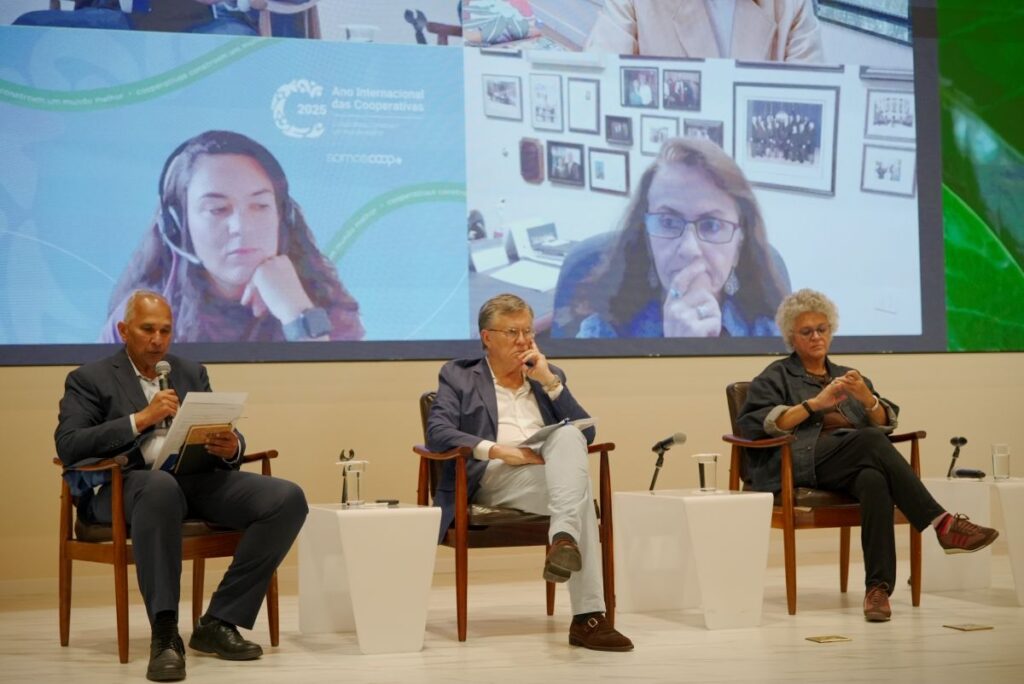
San José, 27 May 2025 (IICA). COP30 will be a focus of global attention when it takes place in Brazil in November, and a unique opportunity for agriculture in the Americas to demonstrate the transformation it has been undergoing, according to experts involved in a meeting convened by the Inter-American Institute for Cooperation on Agriculture (IICA).
The experts also agreed on the importance of the COP’s return to Latin America and the Caribbean; highlighted IICA’s role as an institution that acts as a bridge between governments and the private sector in the region, enabling them to share a unified message regarding the role of agriculture; and emphasized that the climate agenda should be a development agenda that generates benefits for society.
Izabella Teixeira, former Minister of Environment of Brazil, and Tania Zanella, President of the Instituto Pensar Agropecuária (IPA), were the main speakers at the session of IICA’s Advisory Council for the Transformation of Agrifood Systems (CATSA), comprised of eminent individuals working in the public, private, and academic spheres who have made major contributions to the agrifood sector.
“Toward COP30 in Brazil: challenges for positioning sustainable and resilient agriculture in the Americas” was the title of the high-level meeting where participants discussed the likely outcomes for the sector of the upcoming conference, due to be held in the Brazilian city of Belem do Pará.
IICA Director General Manuel Otero opened the session alongside Muhammad Ibrahim, Director of Technical Cooperation.
The IICA Communications Committee, comprised of editors, senior journalists, and communications directors from private sector organizations in various countries of the Americas, held a joint session with CATSA, whose objective is to positively influence public recognition of agricultural chains.
Return to Latin America and the Caribbean
Participants in the debate—held in person at IICA Headquarters and virtually—highlighted the importance of the return of the COP, the world’s largest environmental forum, to the Americas after eleven years.
They agreed that some of the sector’s objectives should be to improve agricultural producers’ access to climate financing, and to seek ways for them to be recognized for their regenerative practices, which contribute to the restoration of ecosystems and biodiversity.
“IICA is moving toward COP30 and aims to position the agriculture sector as part of the solution to the most urgent challenges facing the planet,” observed Muhammad Ibrahim in his remarks during the opening ceremony.
Izabella Teixeira, who led Brazil’s delegation to the COP in 2015, when the Paris Agreement was adopted, emphasized that it was crucial that agriculture in the Americas develop a new narrative for dialogue with the rest of the world, one that reflects its extraordinary productive capacity and enormous biodiversity of its ecosystems.
“The narrative should foreground not only natural resources, but also the fact that the region has solutions. That is a strategic point,” Teixeira said.

“The COP in Brazil will discuss concrete actions for implementing the Paris Agreement, based on an agenda that will be set by the countries in Bonn next June. The effects of climate change are already here, our region is highly vulnerable, and the challenge is to develop new financing models to speed up mitigation. We must work together and realize that our region can be a leader,” she added.
Tania Zanella, from the Instituto Pensar Agropecuária, created by Brazil’s productive sector to defend its interests, stressed that the efforts being made cannot be underestimated: “It’s time to show, with proofs and evidence, what the sector is doing to achieve sustainability.”
Zanella referred to the role of cooperatives in the fair and sustainable transition taking place. She pointed out that in Brazil, 25% of greenhouse gas emissions come from the agriculture sector, which is highly vulnerable to climate events.
“We need to show what’s being done, and COP30 will be a great opportunity. Cooperatives have been central to Brazil’s transformation from a food importer to a food exporter. There are 1179 agricultural cooperatives in the country with more than one million members,” she said.
Zanella also spoke about the barriers to climate financing in rural areas, pointing out that international mechanisms are difficult for small farmers to access, and praised IICA’s role in providing opportunities to connect with international funds.
“COP30 will be a unique opportunity to redesign the flow of climate finance in Brazil. Emphasis will need to be placed on green bonds and payments for environmental services. Producers are the main agents promoting conservation, but they need incentives,” she concluded.
Otero stressed the importance of the region’s agriculture sector having an aggressive communications strategy in order to show what it is really like. “We play a key role in the pursuit of sustainable development for our planet. Our continent has many production models, and our strength lies in diversity,” he observed.
The IICA Director General informed the meeting that the organization will have a pavilion at COP30 in Belém—as it did at previous COPs in Egypt, the United Arab Emirates, and Azerbaijan—along with the private sector and the ministries of agriculture of the Americas.
“We’re going to Belém to demonstrate that the ongoing transformations in the agriculture sector of the Americas are very important. There is a process of change that no one can stop. We need to be more united than ever,” he stated.
“The European Union,” he added, “is dismissive of the transformations taking place in the agriculture sector of the Americas. But the reality is that the transition is underway; it’s an irreversible process, and COP30 is the opportunity to demonstrate that.”
Among those present in the United States Room at IICA Headquarters were Jorge Werthein and Eugenio Díaz-Bonilla, Special Advisors to the Director General; Renata Miranda, IICA Consultant on Innovation and Sustainable Development in Agriculture, focusing on COP30; Rodrigo Lima, Director of the consulting firm AGROICONE; and Walter Baethgen, Senior Research Scientist at Columbia University’s Climate School.

More information:
Institutional Communication Division.
comunicacion.institucional@iica.int











